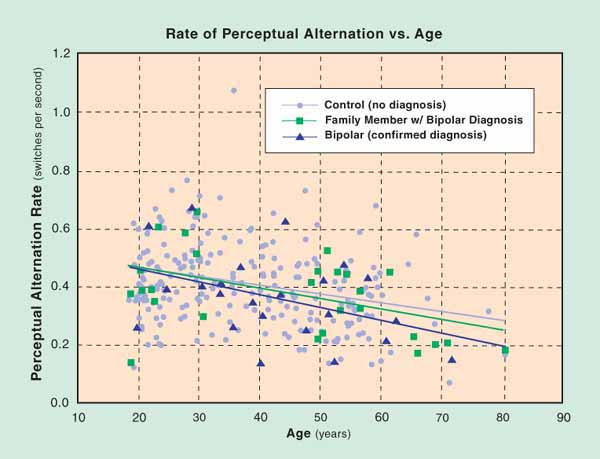

|
NEUROSCIENCE
ABSTRACT, 2002 David G. King, Ph.D., Associate Professor
Following a report that bipolar disorder is associated
with a slow rate of perceptual alternation during binocular rivalry (Pettigrew
& Miller 1998, Proc Roy Soc B 265:2141-2148), we have (by the
time of abstract preparation) measured alternation rate in a sample of
332 adult human subjects including 38 with diagnoses of bipolar disorder
and some with various other diagnoses. Volunteers were recruited
from the diverse community around Southern Illinois University and were
each offered a $10 gratuity. Confirmation of self-reported mental
health status was requested from each subject's health-care provider.
The stimulus for binocular rivalry (0.7 degree circular spot of
moving horizontal or vertical bars) was presented on a computer monitor
and viewed through stereoscopic glasses for 20 minutes (12 periods of
100 seconds each) with perceptual responses indicated by pressing buttons
on the computer's mouse, using software provided by Keith
White (Univ Florida). Rate of alternation was calculated as
the number of rivalrous cycles divided by the total time in rivalry. Preliminary
analysis confirmed Pettigrew
& Miller's finding that mean rate of alternation is lower for subjects
with bipolar disorder than for controls, although we have found a greater
range of rates for control subjects and more overlap between bipolar and
control groups than reported by Pettigrew & Miller. Our data also
revealed an unexpected negative correlation between alternation rate and
age. Any diagnostic application of perceptual alternation rate should
take this age effect into account. |

Further discussion (text of a seminar at the University of Florida, Department of Psychology, on October 31, 2002).
 Comments and questions: dgking@siu.edu
Comments and questions: dgking@siu.edu
SIUC / Zoology / David King
https://dgkinglab.siu.edu/sfn02.htm
Last updated: 21 December 2021 / dgk